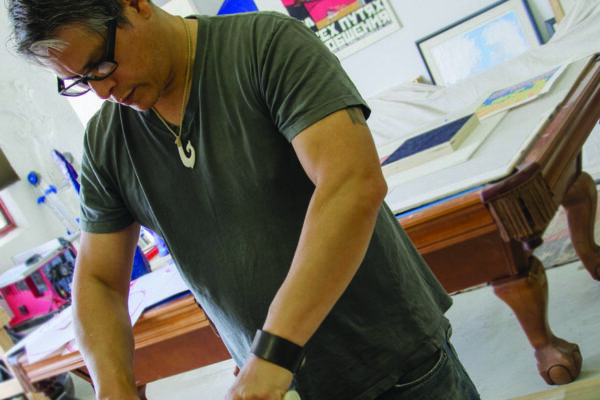As renowned Native American artist Mateo Romero drove along Old Santa Fe Trail on a hot July day, he couldn’t have imagined that he’d soon be lying face down on the ground with a rifle pointed at his head.
He was on his way to pick up his son from school when his dog became ill in the backseat of the car. The road lacked a shoulder wide enough to park safely, so he pulled over into the nearest driveway to clean up the mess and tend to his dog. But when the homeowner arrived in her driveway shortly after, she took one look at Mateo and assumed the worst.
Mateo tried to tell her about his dog and the mess in the backseat of his car, but she wouldn’t listen. He told her he was eager to get on his way, but she refused to move her SUV, strategically parked in front of the driveway exit. She rolled up her window and dialed 911, telling the dispatcher she was worried because two “Hispanics” recently tried to burglarize her home.
Mateo was trapped.
“At first I didn’t really understand what was happening,” said Mateo “Then I realized, ‘Oh she must be calling the police.’”
Afraid of what the police might do to a brown man in a white woman’s driveway, Mateo tried once more to talk to her, but she wouldn’t roll down her window.
“I’m thinking, ‘I’m at risk. I’m going to get shot, I’m going to get shot by the cops. This is dangerous.’”
An officer arrived three minutes later and immediately pointed an AR 15-rifle at Mateo’s head and ordered him to the ground. The officer then cuffed Mateo and threw him in the backseat of a police car, never even asking him why he was in the driveway.
Mateo’s fears were not unfounded. An officer arrived three minutes later and immediately pointed an AR 15-rifle at Mateo’s head and ordered him to the ground. The officer then cuffed Mateo and threw him in the backseat of a police car, never even asking him why he was in the driveway. Even after the officer, and a supervising officer who arrived later, discerned that Mateo had not burglarized the house, they kept Mateo handcuffed and in the back of the police car. With no sense of urgency, and only when it was convenient for them, did they finally ask Mateo for his version of events before uncuffing and releasing him.
The incident happened four years ago, but it’s still fresh in Mateo’s mind. It’s the reason his heart races every time he passes by the Santa Fe Police. It’s the reason he now tells all five of his children never to chase after their football if they accidentally throw it over a fence onto someone else’s property. And it’s the reason he no longer has a studio in the area.
“I just felt like I was belittled as a man,” says Laquonte.
“It’s like a simmering posole pot. And I’m sure the heat has been turned up with Trump. I’m sure the posole pot is overflowing at this point.”
The ACLU of New Mexico currently represents Mateo Romero in a lawsuit against the Santa Fe Police Department for depriving him of his Fourth Amendment right to be free from arrest when no investigation was done to discern probable cause and for continuing to detain him after determining he hadn’t committed a crime. The ACLU of New Mexico recently settled its lawsuit on behalf of Laquonte Barry against the local convenience store for engaging in unlawful discriminatory practices.
Both men hope that in talking about their experiences, they will bring awareness to the ongoing issue of racial discrimination so that lasting change can be made.
This article originally appeard in the 2018 spring edition of The Torch.


